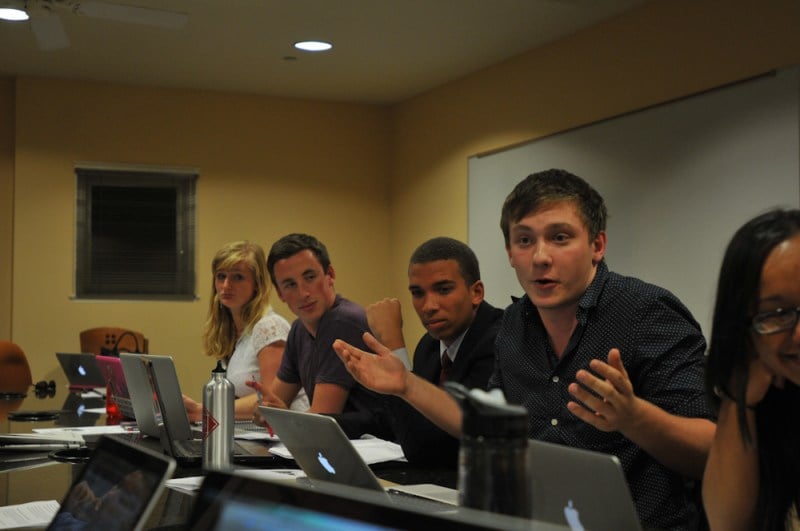Next Tuesday, the 15th Undergraduate Senate will vote on a bill to overrule changes made to bylaws of the Board of Judicial Affairs (BJA) without obtaining input from the Senate.

While the BJA has the authority to implement these changes through majority vote, Senator John-Lancaster Finley ‘16, the Senate point person on matters pertaining to the BJA, and several other senators—as well as the Graduate Student Council (GSC)—are concerned about their lack of input in this process.
Both Associate Dean & Director of the Office of Community Standards (OCS) Koren Bakkegard and Dean of Student Life Chris Griffith were present at the meeting, which intended to focus on establishing a better working relationship between the ASSU and the OCS. Instead, the focus moved largely to the senators’ concern with the OCS’s desire to shift judicial affairs into an educational process, and to the lack of student input provided in this decision.
Senate Chair Ben Holston ‘15 received an email last June about proposed changes to the interpretation of the honor code and the bylaws, but found out in late September that these bylaws had already been changed when the Senate was out of session for the summer.
Finley said he and the Senate were left completely in the dark about any of the changes.
Both Finley and Holston mentioned their hesitancy to take action in June because they were waiting on updates from ASSU Executive Billy Gallagher, who, according to the senators, was looking into the matter.
“It seems like [BJA] really want to amend the spirit of the charter and in order to do that you need an actual charter amendment—which requires our approval, not just forwarding [an email] to the chair—which is why I’m opposed to all of it,” Finley said.
In response, the Undergraduate Senate and the GSC have each drafted similar bills to overrule the BJA bylaws. The Undergraduate Senate will vote on its bill next Tuesday, following a senate discussion with one of the BJA co-chairs.
“The entire change in the bylaws reflects an attitude of moving away from the judicial process and moving towards one more focused on education,” Finley said after the meeting. “I think that having an educational process kind of means the presumption of guilt, in that it’s saying you’ve done something wrong and we are going to educate you on how to make it better.”
Senator Ilya Mouzykantskii ‘16 agreed.
“My concern is that, based on the case study and anecdotal reports that I as a senator and other senators have received, [the judicial charter of 1997] is flatly being ignored,” Mouzykantskii said after the meeting. “I’m concerned that the decisions that are being made violate the spirit and the word of the judicial code.”
Mouzykantskii asked Griffith four times when the student body would be receiving a response to the case study. Griffith answered, saying that she had responded to individuals on the phone, in email and through in-person meetings, and that this was no longer relevant.
“I believe that the campus community deserves a written and succinct response to the case study, and the fact that the Office of Community Standards does not want to provide that is damning,” Mouzykantskii said.
Senators also raised other concerns with the allegations made in the case study, some of which were refuted by Griffith and Bakkegard. Despite the heated conversation, the open forum concluded with a desire from both the OCS and the Senate to increase student input into the process.
Griffith specifically suggested creating a committee that included a subset of the Senate and the GSC to start working with the OCS to learn about the process and provide input. Holston plans to start working on creating this committee as soon as possible.
“There are serious issues that they didn’t provide satisfactory enough answers for, so there’s more work to be done,” Holston said. “I think it’s going to be more appropriately handled in a committee setting.”
During the second portion of the meeting the Senate passed the Winter Quarter Grant Bill—which will allow general fees groups to apply for money for winter quarter events—and the Senate Innovation Bill.
The Senate Innovation Bill, which barely passed the necessary 2/3 vote, will give each senator $3,000 to pursue both students’ and their own initiatives in the Stanford community. Mouzykantskii—who authored the bill with the help of Assistant Financial Manager Stephen Trusheim ‘13 M.S. ‘14—was particularly excited about its passing.
Mouzykantskii also followed up on the 8:30 a.m. class discussion from the previous week. He and ASSU Executive Dan Ashton ‘14 attended the Faculty Senate meeting last Thursday and received positive feedback from their proposed amendment.
The Undergraduate Senate unanimously passed the resolution supporting the amendment to push back the registrar’s proposed new schedule by 30 minutes, which would keep the earliest class times beginning at 9 a.m. Additionally, the Senate passed $24,298.14 in funding bills.
Contact Lucy Svoboda at lsvoboda ‘at’ stanford.edu.
